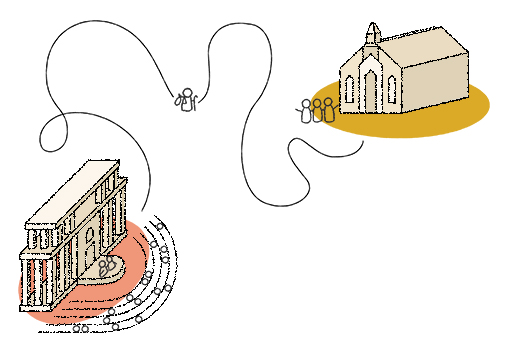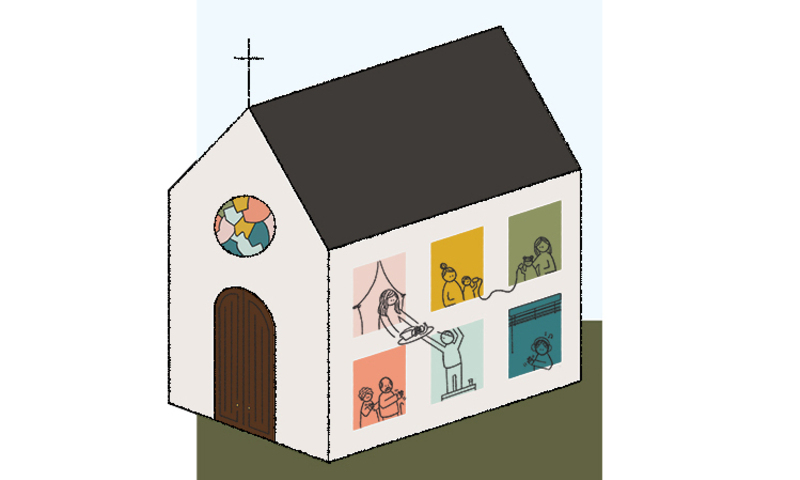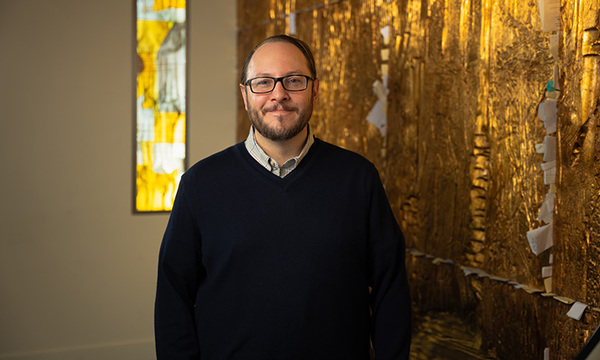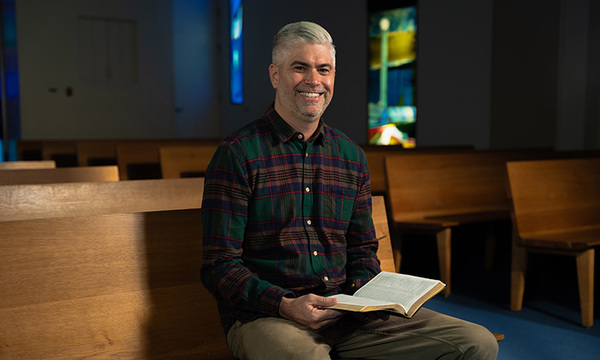Folks at church often ask me what I do at Talbot School of Theology. My response usually goes something like this:
“Well, I’m paid to teach Greek. But I’m called to turn our students’ view of the church right-side up. I want to help students see that the church is not a commodity that exists to meet the needs of the individual believer but, rather, a society of siblings who have decided that the relational health and public testimony of the family of God are more important than anyone’s personal spiritual pilgrimage.”

For the early Christians, “family” was more than an empty metaphor and “brothers” was more than a punctuation mark in Paul’s letters. We see this in living color in an inspiring story from the ancient church in North Africa living out its church family values.
Sometime around 250 A.D., in the rural town of Thena, just outside the Roman city of Carthage, a pagan became a Christian. We do not know the fellow’s name, so we will call him Marcus. His conversion created quite a stir in the church in Thena because Marcus was an actor in the Greco-Roman theater and the ancient theater was entangled in some highly questionable morality.
Most problematic was the theater’s association with pagan religion. Performances were typically dedicated to pagan gods, and they often ran as part of larger public religious festivals. Scenes portraying blatant immorality were commonplace. Church leaders were universally outspoken in their opposition to the ancient theater.
Tertullian, an early second-century leader from Carthage, apparently ran into Christians who found it acceptable to view immorality on the stage, provided they did not engage in such behavior in real life. He categorically rejects this kind of rationalization: “Why is it right to look on what it is disgraceful to do? If you are going to forbid immorality, you’d better forbid the theater. What you reject in deed, you are not to bid welcome in word” (De Spectaculis 17).
Now if Christian leaders had this much of a problem with believers who attended the shows, you can imagine how they felt about the performers themselves. When an actor converted to Christ in third-century Carthage, the first thing the church demanded of him was to quit his profession and to disassociate himself from the theater forever.
Our actor friend, Marcus, did just that. Marcus became a follower of Jesus. He bowed to the demands of the Christian community and stopped acting in the local theater. Our new convert now faced an economic dilemma, however, since he was no longer gainfully employed. So, instead of acting, Marcus decided — hear this well — to teach acting. Marcus opened an acting school.
This apparently did not set well among Marcus’s fellow Christians. Soon both the pastor of the small church in Thena and the bishop of the big-city congregation in Carthage found themselves embroiled in the ensuing damage control. The surviving letters exchanged by these two Christian leaders paint an inspiring portrait of the church living out its surrogate family values.
Marcus’s pastor, Eucratius, naturally sensed a certain contradiction in his new convert’s behavior. After all, how could it be acceptable for Marcus to teach others to do what he himself was forbidden to do? Yet Marcus had already made a tremendous sacrifice to follow Jesus, a sacrifice that had cost Marcus his job. So Eucratius wrote to his spiritual mentor, Cyprian of Carthage, to ask “whether such a man (Marcus) ought to remain in communion with us.”
For Cyprian there simply was no place for moral compromise in the Christian life. His convictions about Marcus working as a drama teacher could not be more straightforward: “It is not in keeping with the reverence due to the majesty of God and with the observance of the gospel teachings for the honor and respect of the Church to be polluted by contamination at once so degraded and so scandalous” (Ep. 2.1.2).
No compromise. No drama teaching. Marcus must either leave the church or quit his job — again!

Now Cyprian is not unaware of the hardship that will come upon Marcus if he stops teaching his craft. The intense emphasis upon personal holiness that characterized the North African Christian church had a beautiful complement: a genuine concern for those whose livelihoods might be adversely affected by assenting to the church’s demanding moral standards. In short, Cyprian tells Pastor Eucratius that the church should provide for Marcus’s basic needs:
“His needs can be alleviated along with those of others who are supported by the provisions of the Church. … Accordingly, you should do your utmost to call him away from this depraved and shameful profession to the way of innocence and to the hope of his true life; let him be satisfied with the nourishment provided by the Church, more sparing to be sure but salutary” (Ep. 2.2.2-3).
And if this is not enough, Cyprian concludes his letter by telling Eucratius that Cyprian’s church will foot the bill if the rural church in Thena lacks the resources to meet Marcus’s basic needs: “But if your church is unable to meet the cost of maintaining those in need, he can transfer himself to us and receive here what is necessary for him in the way of food and clothing” (Ep. 2.2.3).
Cyprian demanded of those in God’s family an uncompromising standard of Christian morality. God’s people would be radically different than the pagans in the dominant culture. But Cyprian made sure that the family of God would serve as the economic safety net for any brother or sister whose livelihood was adversely affected by their willingness to follow Jesus.
We have no surviving letter of reply from Eucratius to Cyprian, to let us know whether or not Marcus agreed to shut down his acting school and to rely on his faith family to meet his needs. We are on solid historical ground, however, to assume that he did, because history has shown us that pagans in Carthage were consistently attracted to the intensely moral, highly supportive, surrogate family model that characterized the North African church.
Fifty years before Marcus found the Lord, Tertullian could boast to the North African Roman pagans, “Day by day you groan over the ever-increasing number of Christians. Your constant cry is, that your state is beset by us, that Christians are in your estates, your camps, your blocks of houses … that persons of every age and every social rank are passing over from you to us” (Ad Nat. 1.4; Apol. 37.4).
How could this have happened? How could a small Judean sect, arising in a province located at the eastern-most fringes of the Roman Empire, have expanded its ranks steadily for more than two centuries in the face of often sporadic and local, sometimes consistently legislated, opposition? One of Rome’s emperors, who was not at all happy with the growth of early Christianity, thought he had the answer to that question.
The fellow I am about to quote is a real “piece of work.” His name says it all — Julian the Apostate. His uncle was Constantine, the first Roman emperor who professed allegiance to Christianity. Constantine had put an end to the Christian persecutions a couple generations before Julian walked onto the stage of imperial political history. Much of the empire was at least nominally Christian in Julian’s day, and Julian was provided with the best in theological education. Julian turned his back on the Lord, however, and converted to paganism. Through a series of political intrigues and military victories he became emperor in 361 A.D. Julian then embarked upon a mission to turn the Roman Empire back to the gods and goddesses of paganism.
Among Julian’s surviving works is a letter to a pagan priest in Galatia. Julian recognizes that in his efforts to resuscitate paganism he must first figure out why Christianity has been so successful: “Why do we not observe that it is the Christians’ benevolence to strangers, their care for the graves of the dead and the pretended holiness of their lives that have done the most to increase atheism? When the impious Galileans support not only their own poor, but ours as well, all men see that our people lack aid from us.”
Julian is convinced that Christians attracted people through tangible expressions of love directed toward each other and toward those outside the church.
Another pagan detractor, Lucian of Samosata, was more specific. He traced behavior like this back to the family metaphor in the teaching of Jesus. Lucian disparagingly wrote: “[T]heir first lawgiver [Jesus] persuaded them that they are all brothers of one another. … Therefore they despise all things indiscriminately and consider them common property” (13).
As Tertullian would remark a few decades later: “We call ourselves brothers. So, we who are united in mind and soul have no hesitation about sharing what we have. Everything is in common among us—except our wives” (Apol. 39.8-11).
The expansion of early Christianity during the first three centuries has intrigued scholars for generations. It ought to get the attention of today’s church leaders, as well. What was the secret to the success of the Christian movement?
The easy answer is that God was at work. And this was certainly the case. But just what kind of Christian community does God work in? In Acts 4:32–35, Luke seems to think that God works mightily among Christians who tangibly put into practice the idea that the church should function as a family:
32 And the congregation of those who believed were of one heart and soul; and not one of them claimed that anything belonging to him was his own, but all things were common property to them. 33 And with great power the apostles were giving testimony to the resurrection of the Lord Jesus, and abundant grace was upon them all. 34 For there was not a needy person among them, for all who were owners of land or houses would sell them and bring the proceeds of the sales 35 and lay them at the apostles’ feet, and they would be distributed to each as any had need. (NASB)
Notice a couple things here. First, can you see how Luke’s comment about the great work of God in the congregation (v. 33) is sandwiched between two images of the church functioning at its “family best” (vv. 32 and 34–35)? It is almost as if Luke is making some sort of connection between Christian community and the public proclamation of the gospel.
Well, he is! Note the word “For” in the NASB at the beginning of verse 34. Some English translations omit the word (e.g., ESV, NRSV). That is unfortunate, because it is there in the Greek text, where the conjunction makes an explanatory connection between (a) the social solidarity of the church outlined in v. 34 and (b) the mighty work of God described in v. 33.
In recent decades Christian leaders in America have somehow become convinced that the way to attract unbelievers to the faith is to turn the church into a commodity. The early Christians knew better. They allowed the Holy Spirit to turn the church into a community. Pagan detractors like Emperor Julian and Lucian of Samosata stood up and took notice. Converts like our actor friend Marcus from the church in Thena benefited tremendously. And the world was never the same.
 Biola University
Biola University



